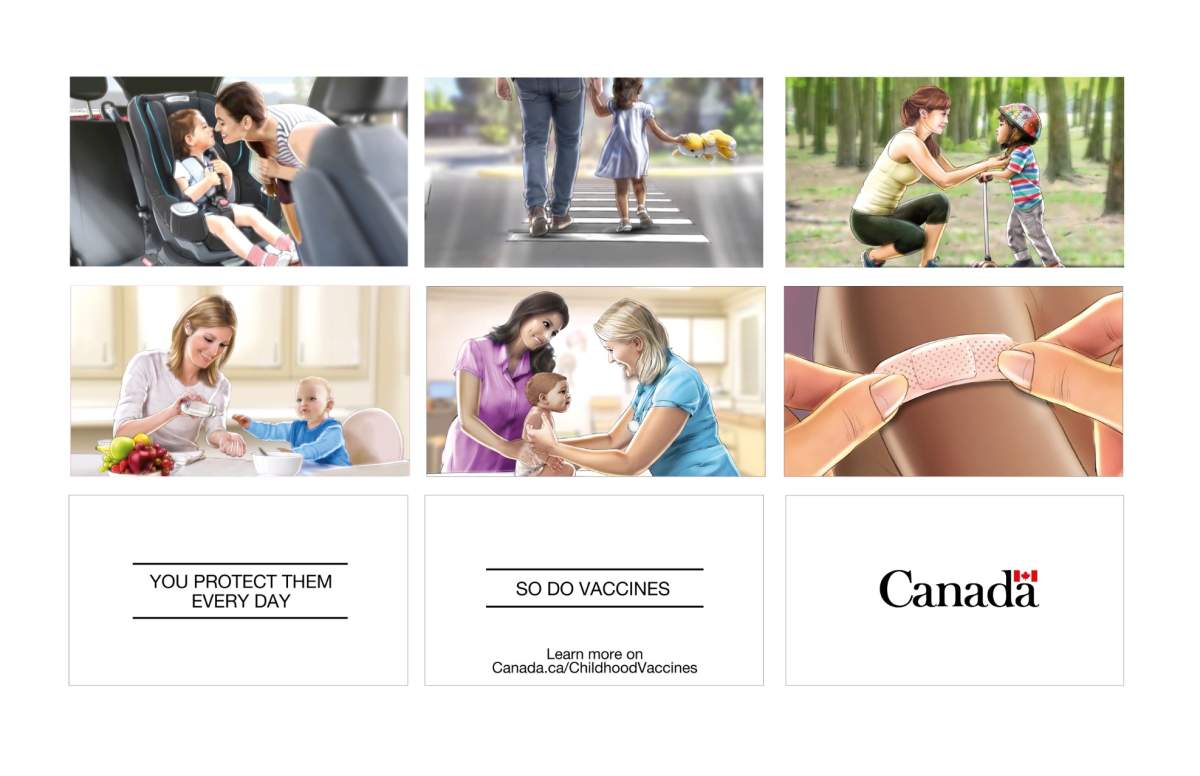Editor’s note: An initial version of this story stated that the final vaccination campaign had not yet launched. In fact, it did launch with one of the proposed advertisements earlier in 2018. Global News regrets the error.

The federal government stuck with a traditional ad campaign promoting childhood vaccination this spring after focus groups initially panned its efforts to come up with more creative proposals, newly released documents suggest.
Parents and parents-to-be across Canada were asked to review three different ad mock-ups last winter, and given visual “storyboards” to help them picture how the final videos would appear on television or online.
READ MORE: How a decades old, fraudulent anti-vaccine study still affects public health
The Public Health Agency of Canada launched a nationwide childhood vaccination awareness campaign this spring aimed at promoting the importance, safety and effectiveness of vaccines.
WATCH: Anti-vax mother warns others of daughter’s whooping cough ‘nightmare’

Experts have blamed a decline in vaccination rates in Canada, and the reemergence of certain long-defeated illnesses, on the anti-vaccination movement and “fence-sitting parents.”
Yet the focus groups were seemingly unimpressed by Ottawa’s efforts to combat that trend. The most negative reactions were prompted by this ad proposal, dubbed simply “kiss”:
In a final report prepared for the Public Health Agency and released online earlier this week, respondents described the ad as “uncomfortable,” “shocking,” “weird,” “negative” and even “disturbing” because it seemed to sexualize the young children and promoted kissing, which can spread other kinds of illness like the common cold.
“It says it’s OK to swap bodily fluids if you’re vaccinated,” said one respondent in Vancouver. “Feels sexual. I’m not pleased.”

Get weekly health news
The firm hired to conduct the focus groups, Corporate Research Associates Inc., wrote that parents reacted to the proposed ad with “nervous laughter, raised eyebrows and head shaking,” and that a “good number of participants across groups considered that the concept made them less comfortable about childhood vaccination.”
Bullying Fran?
A second proposed ad didn’t fare much better.
It shows three young girls engaged in a clapping game and singing “Itchy rash, itchy rash, cranky Fran. Her fever’s rising as high as it can. Coughing, and sneezing, and feeling sleepy. She’s spreading infection to you and me.”
As the last syllable is sung, one child slaps another girl’s hand and she’s knocked out of the game.
Parents and parents-to-be in Montreal seemed to like this one, but everywhere else, it got a failing grade. The main takeaway for the focus groups was that the girls were bullying another child named Fran for being sick and not being vaccinated.
“It’s not nice to laugh about a sick kid,” noted one parent in Toronto.
The last option was perhaps the most traditional, and was the one (with some tweaks) that Canadians ended up seeing on their screens, as reactions to it were more positive.
The basic message emphasizes protecting your children with vaccination the same way you would when you strap them into a car seat, hold their hand while crossing a street, or check the temperature of their food.
The research team did note that the worst thing that Ottawa can do is to outwardly attack parents who have delayed or refused vaccines for their children, or those who are thinking about it.
These parents “do not want to be judged or perceived as having made an irrational decision,” the report notes.
“These findings suggest that online information from the Government should address individuals with respect, and that information be provided in a non-judgmental, objective format that includes various options.”
The report also recommended that the government website dedicated to informing parents about vaccination should have a simple, easy to remember address. The ads, meanwhile, need to “include a stronger call to action to visit the website, in the form of a short question or a myth-busting fact.” The final ad did not reflect that feedback.
The research was conducted in January using a total of eight focus groups in Montreal, Vancouver, Toronto and St. John’s. Each group was made up of 12 participants, and included a mix of ages, education levels and household incomes, where possible.
The total cost was $61,045, plus tax.
- Daylight saving time 2026: Here’s when you should set your clocks forward
- Conservative MP searches for ‘antifa’ in federal government, Canadian Armed Forces
- Liberals survive confidence vote as House passes budget implementation bill
- Canadians stranded in Puerto Vallarta after violence disrupts flights home to Edmonton











Comments
Want to discuss? Please read our Commenting Policy first.